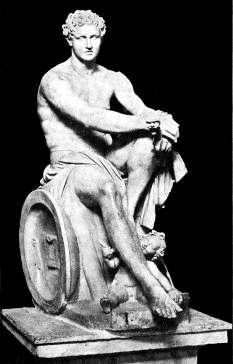Quirinus
| Line 3: | Line 3: | ||
[[Image:quirinus.gif|frame|right|Quirinus.]] | [[Image:quirinus.gif|frame|right|Quirinus.]] | ||
| − | + | Quirinus is the deified [[Romulus]], the founder of Rome. He was served by the [[Flamen (Nova Roma)|Flamen]] Quirinalis, one of the three major flamines who served the oldest gods of Rome. His [[feriae|festival]], the Quirinalis, was celebrated February 17. | |
| − | = Connections to Other Gods = | + | == Connections to Other Gods == |
| − | His consort and cult partner was [[Hora]] | + | He was son of [[Mars]] and [[Rhea Silvia]]. His mother was a descendant of [[Aeneas]]. His consort and cult partner was [[Hora]]. |
| − | = Historical Development = | + | == Historical Development == |
| − | + | Quirinus was originally a Sabine god of storms and thunder. He was assimilated into the state cult of Rome when Rome annexed the [[Quirinal]], a fortified settlement for whom Quirinus was the eponymous. Under Greek influence, he lost his original attributes to Iuppiter, but continued, with Iuppiter and Mars, to form the triad of sky gods. By the time of the late Republic, he had become the deified form of Romulus. Prominent in early Rome, he faded into obscurity in later times. | |
| − | = Cult = | + | == Cult == |
The [[feriae|festival]] of Quirinus, called the ''Quirinalia'' was celebrated on {{Feb 17}}. However, very little is known about his cult. His sacred tree was the myrtle. | The [[feriae|festival]] of Quirinus, called the ''Quirinalia'' was celebrated on {{Feb 17}}. However, very little is known about his cult. His sacred tree was the myrtle. | ||
| − | = Iconography = | + | == Iconography == |
Quirinus was depicted as a bearded man, wearing a combination of military and clerical clothing. | Quirinus was depicted as a bearded man, wearing a combination of military and clerical clothing. | ||
[[Category:Roman Gods]] | [[Category:Roman Gods]] | ||
Latest revision as of 04:12, 7 April 2008
Home | Latíné | Deutsch | Español | Français | Italiano | Magyar | Português | Română | Русский | English
⚜⚜⚜ Site Index - Key Pages ⚜⚜⚜
Quirinus is the deified Romulus, the founder of Rome. He was served by the Flamen Quirinalis, one of the three major flamines who served the oldest gods of Rome. His festival, the Quirinalis, was celebrated February 17.
Contents |
Connections to Other Gods
He was son of Mars and Rhea Silvia. His mother was a descendant of Aeneas. His consort and cult partner was Hora.
Historical Development
Quirinus was originally a Sabine god of storms and thunder. He was assimilated into the state cult of Rome when Rome annexed the Quirinal, a fortified settlement for whom Quirinus was the eponymous. Under Greek influence, he lost his original attributes to Iuppiter, but continued, with Iuppiter and Mars, to form the triad of sky gods. By the time of the late Republic, he had become the deified form of Romulus. Prominent in early Rome, he faded into obscurity in later times.
Cult
The festival of Quirinus, called the Quirinalia was celebrated on a.d. XIII Kal. Mar. ‡. However, very little is known about his cult. His sacred tree was the myrtle.
Iconography
Quirinus was depicted as a bearded man, wearing a combination of military and clerical clothing.
